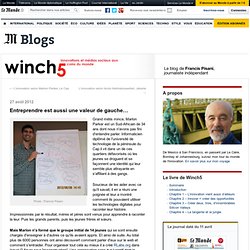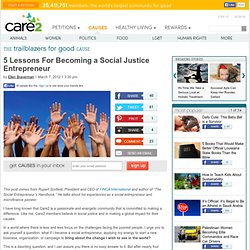

Entreprendre est aussi une valeur de gauche… Photo : Francis Pisani Grand métis mince, Marlon Parker est un Sud-Africain de 34 ans dont nous n'avons pas fini d'entendre parler.

Informaticien diplômé de l'université de technologie de la péninsule du Cap il vit dans un de ces quartiers défavorisés où les jeunes se droguent et se façonnent une identité qui leur semble plus attrayante en s'affiliant à des gangs. Soucieux de les aider avec ce qu'il savait, il en a réuni une poignée et leur a montré comment ils pouvaient utiliser les technologies digitales pour raconter leur histoire. Impressionnés par le résultat, mères et pères sont venus pour apprendre à raconter la leur. Puis les grands parents, puis les jeunes frères et sœurs. Mais Marlon n'a formé que le groupe initial de 14 jeunes qui se sont ensuite chargés d'enseigner à d'autres ce qu'ils avaient appris. A mesure qu'ils mettaient la main à la pâte, jeunes et moins jeunes se sont retrouvés confrontés à d'autres problèmes.
> Voir la vidéo : L'innovation selon Marlon Parker. Five Lessons For Becoming A Social Justice Entrepreneur. This post comes from Rupert Scofield, President and CEO of FINCA International and author of “The Social Entrepreneur’s Handbook.”

He talks about his experiences as a social entrepreneur and microfinance pioneer. I have long known that Care2 is a passionate and energetic community that is committed to making a difference. Like me, Care2 members believe in social justice and in making a global impact for their causes. In a world where there is less and less focus on the challenges facing the poorest people, I urge you to ask yourself a question: what if I became a social entrepreneur, applying my energy to start a new business, organization, or campaign to bring about the change I wish to see in the world?
This is a daunting question, and I can assure you there is no easy answer to it. Here are five lessons for entrepreneurs who are thinking of taking the plunge into social action: 1. 2. 3. 4. 5. To learn more about FINCA, please visit www.finca.org. Related Stories: David C. Hodgson: Social Entrepreneurship Soars as a Career Choice: Finding meaning in work and life. Has "social entrepreneur" become a career of choice?

Twenty-five years ago, at the founding of Echoing Green, an organization that provides seed money and support to promising social entrepreneurs, young people wanted to be doctors, lawyers or business executives. No one ever said they wanted to be a social entrepreneur. Very few people had even heard the term, which was coined by Bill Drayton, who in 1981 founded Ashoka, a global association of the world's leading social entrepreneurs. Yet today, I often hear young people say, "I want to be a social entrepreneur. " Now, being a social entrepreneur is a real choice, popularized by great examples (think of the founders of Teach For America, Freelancers Union and City Year, all of which were launched by Echoing Green Fellows) and supported by university curricula.
The surge in interest is reflected in Echoing Green's annual call for Fellows. I was also struck by how much had changed in a quarter of a century.